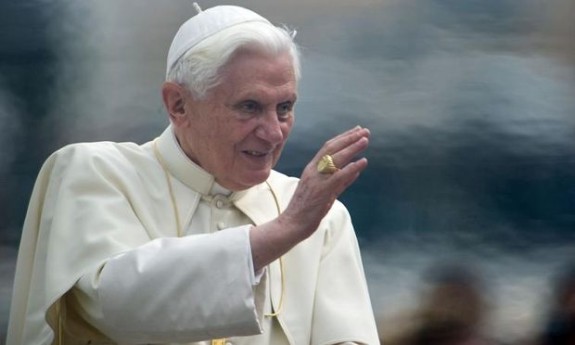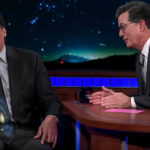Did Pope Benedict Really Dismiss Evolution as ‘Science Fiction’?
by Dr. Stacy Trasancos
Filed under Evolution
In a recent letter to Piergiorgio Odifreddi, Italian atheist and mathematician, Pope Emeritus Benedict XVI used the term "science fiction." Odifreddi is the author of the 2011 book Dear Pope, I'm Writing to You, a critique of Benedict's theological writings. Benedict's letter is a response to that book, extracts of which were recently published in the Italian daily newspaper La Repubblica.
In Odifreddi's book he referred repeatedly to theology as "science fiction." Benedict pointed out that "science fiction" instead exists in science (English translation here):
"Science fiction exists, on the other hand, in the ambit of many sciences. That which you explain about theories concerning the beginning and the end of the world in Heisenberg, Schrödinger, etc., I would designate as science fiction in the good sense of that phrase: they are visions and anticipations, in order to reach a true knowledge, but they are also, precisely, only imaginations with which we seek to come close to reality. There indeed exists, science fiction in a grand style, for instance, within the theory of evolution. The “selfish gene” of Richard Dawkins is a classic example of science fiction."
The Pope Emeritus is using a very precise and technical definition of the term "science fiction," and using it in a positive way. The word "fiction" refers to something imaginatively invented, and such imagination is sometimes useful in science.
That sounds rather shocking, but it is easily explained. There is an oft-missed distinction between what is imaginable and what is conceivable, and it has to do with the difference in the senses and the intellect.
Imagination is based on sensory experience. We can only imagine what we might see, smell, taste, touch, or hear. We can make mental pictures of material things, which is why we can imagine a purple dragon spitting glitter even if we've never been assaulted by one.
Conceptual reasoning beyond the material realm is done with our intellect. Mathematicians rely on the intellect; Christians use it to understand certain dogmas, such as that of the Holy Trinity. This is the very basis of the human act of understanding (to stand under) anything.
The reality of any abstract or spiritual statement must be examined by the intellect, not the imagination. If an abstract statement is rejected, it is rejected on the basis of a contradiction in terms. This is why we say that infinitely parallel lines or three Persons in One God are conceivable, and square circles and omnipotent gods limited by time and space are inconceivable. This is also why it is incorrect to say that theology is "science fiction" since theology is the work of the intellect and not the imagination.
Science, however, deals with material reality. The picture-making power of the mind can distract the intellect (just ask a college student cramming for finals), but it can also be helpful, such as Pope Benedict indicated in the phrase "science fiction."
Exact science is limited to the quantitative measurement of material objects in motion, but as we all know, science has led beyond realms visible to the human senses. Atoms in a beaker cannot be counted with the eye any more than the distance between stars can be measured with a ruler. Time-resolved femtosecond luminescence data are not collected by direct observation. Evolution over millions of years is not witnessed by anyone. Those things are beyond the human senses, but are still questions of material reality.
Sometimes an imaginatively invented—i.e. fictitious—model is helpful to grasp deeper understanding of material things unseen. The British physicist A. Brian Pippard recognized this model-building necessity in a lecture given to a general audience at Cambridge.
"I think history shows that the imagination needs these props. Few can build without scaffolding; in Maxwell’s equations and Einstein’s relativity what we see is the final result of a long process, after the scaffolding has been removed. Even Einstein in his quantum theory developments was unashamedly guided by private models of an as—yet—unobserved atomism." ("The Invincible Ignorance of Science," Contemporary Physics, 1988)
The physical sciences are full of "science fiction" models that aid in the explanation of data. Atoms do not really look like mini-solar systems and molecules are not made of tiny sticks and balls. Space was once imagined to be a sea of aether whirlpools linked by idle wheels, a rejected model that served a purpose in its time, a "vision and anticipation, in order to reach a true knowledge."
So did Pope Benedict really dismiss evolution as science fiction? No, he called it science fiction in the sense that it is a mental model, which is not a dismissal, but an acknowledgement. Pope Benedict and the Church have been consistently positive toward evolutionary theory as an explanatory model. That offspring differ slightly from the parents and therefore respond to the environment in slightly different ways, is obvious. Natural selection, genetic mutation, and population changes are quantifiable scientific observances. Evolutionary theory is a valid explanatory model insofar as it seeks to explain what is within the boundaries of science, something the Church absolutely insists upon.
Science cannot measure spiritual or immaterial substances; therefore, science can say nothing of the existence of the soul, angels, or God. Those are strictly matters for the intellect. Any scientific theory that violates those boundaries is bad science, "science fiction" in the truly negative and absurd sense of the term.
Pope Benedict is well aware of these distinctions and limitations. Arguably the greatest theologian of our times, Pope Benedict has also never shied from praising what is praiseworthy in the opinions of others, even if, with characteristic graciousness, he shreds the erroneous philosophical view overall.
This is why Pope Benedict was not dismissing the work of Richard Dawkins either. In fact, in calling the theory of evolution an example of "science fiction in a grand style" he may have been offering some praise. In citing Dawkins' work on the "selfish gene" as a "classic example of science fiction" he seems to be complimenting an aspect of Dawkins' life work. That model may explain something about evolutionary stability within populations.
It may also explain something of cultural evolution among humans, as "memes" do. The Church teaches that humans have the spiritual powers of intellect and free will, so it follows that human cultures would evolve throughout history. While that is not an exact science nor is it an idea that could ever disprove the existence of the soul or of God, as those with poorly controlled imaginations may claim, it is nonetheless a valid topic for reasoned discourse.
Taking all of this together with an ecumenical frame of mind, it is certainly worth a smile to realize what Pope Emeritus Benedict XVI has actually done by calling evolution and Dawkins' work science fiction. Maybe even a chuckle.
Related Posts
Note: Our goal is to cultivate serious and respectful dialogue. While it's OK to disagree—even encouraged!—any snarky, offensive, or off-topic comments will be deleted. Before commenting please read the Commenting Rules and Tips. If you're having trouble commenting, read the Commenting Instructions.













